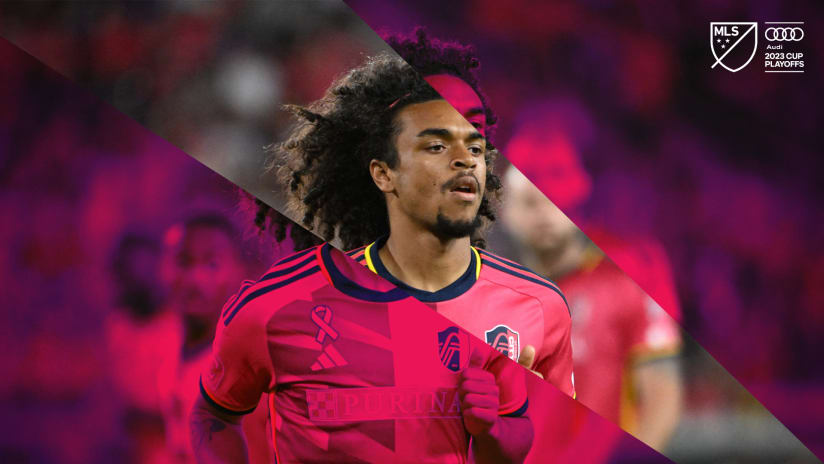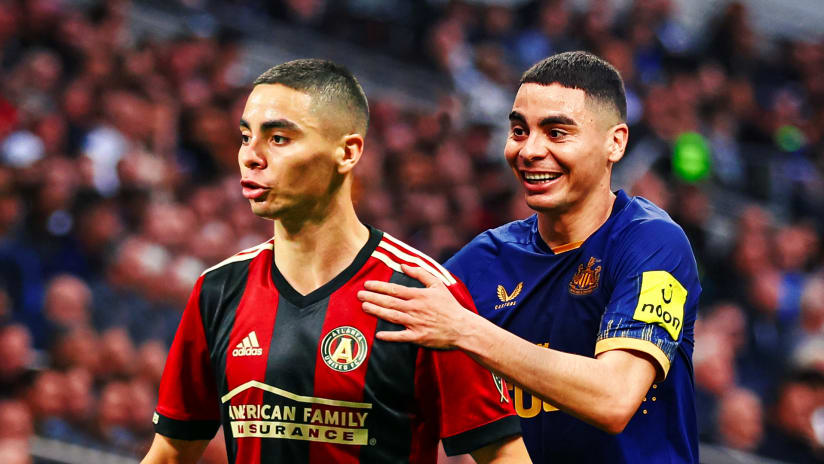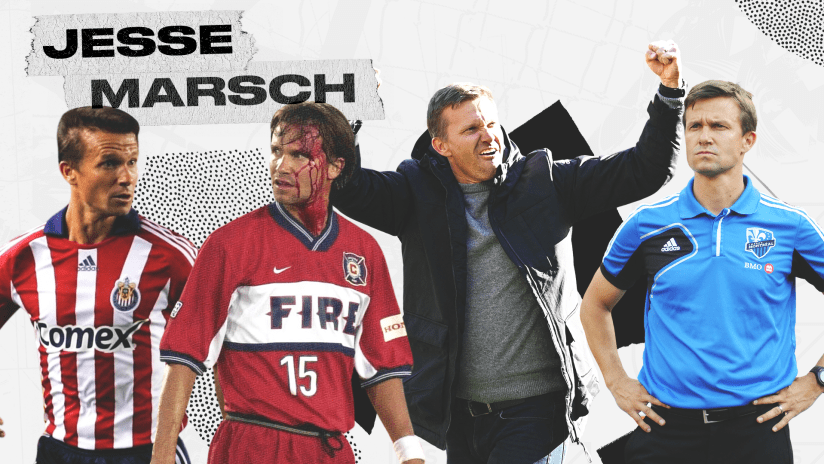THE WORD is MLSsoccer.com's regular long-form series focusing on the biggest topics and most intriguing personalities in North American soccer. This week, contributor Dave Zeitlin examines the few remaining relics of the famed Bethlehem Steel, a once-dominant American soccer team still honored today by the Philadelphia Union.
WILLOW GROVE, Pa. – Dan Morrison jumps up from his dining room table, hurries over to the next room of his suburban Philadelphia home, and returns with a giant photograph enclosed in an old-fashioned frame.
“This is the pinnacle,” he says excitedly. “I mean, this is just the pinnacle.”
Morrison’s eyes dart from one side of the photograph to the other as he begins to recite the names of the men staring back at him – members of the 1917-18 Bethlehem Steel Football Club. And with every one of those names comes a story of the players who that year led Bethlehem to the third of the club’s record five US Open Cup championships.
There’s Tommy “Whitey” Fleming, the most recent addition to National Soccer Hall of Fame and one of Morrison’s favorites because of his “winning personality.” Look at Fred Pepper, who Morrison always recognizes right away because of his “ugly little mug.” Don’t forget Billy Sheridan, the manager who carried a satchel of cash and a pistol on road trips.
And the guy wearing a suit because he was too injured to play but was still fit enough to be a lineman? That’s Bobby Morrison, of course. Uncle Bobby.
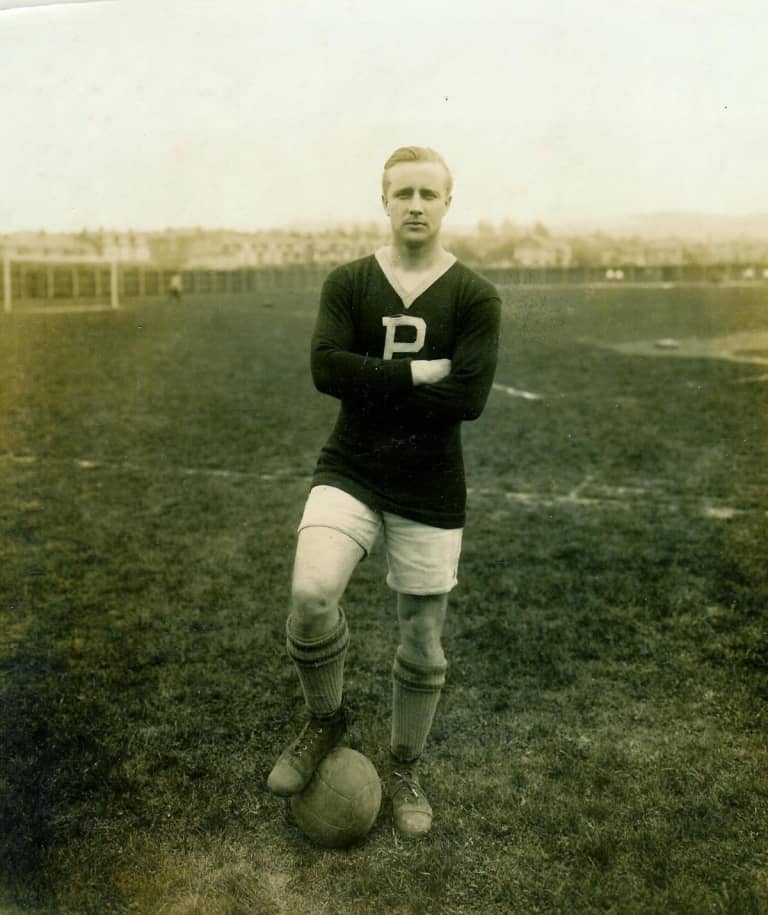
The Bethlehem Steel's Harold Brittan poses for a photo in 1921. The team was originally founded using employees of the Bethlehem Steel Corporation, and went on to become the dominant team of their era. (Photo courtesy of Dan Morrison)
To just about everyone else in the world, this team photo would hold very little significance – a dusty relic of a mostly forgotten era. But for Dan Morrison, the Bethlehem Steel Soccer Club – a team that was sponsored by the Bethlehem Steel Corporation, once America’s largest shipbuilder – has become a part of his life. It’s always been a part of his life.
Growing up, he said, it was “part of family lore” that two of his great uncles, Bobby and Joe Morrison, played for the Steel. But not knowing much else about them – other than the fact that Bobby is a member of the National Soccer Hall of Fame – he decided to research the soccer club that formed in 1907 and folded in 1930.
For three years, Morrison, a pastor by day, made the one-hour drive to the Bethlehem Public Library every Saturday, dug through reels of microfilm and transcribed roughly 3,000 newspaper accounts onto his website. He searched for memorabilia at antique stores, interviewed relatives of players and visited the players’ old houses on the north side of Bethlehem, the industrial Lehigh Valley town about 60 miles north of Philadelphia.
Although his plan to write a book on the social history of the Bethlehem Steel F.C. never came to fruition, today Morrison serves as something as the Steel’s de facto historian, preserving the rich history of a club he often calls “the New York Yankees of their era.”
“They’re clearly the best American team ever,” he says. “They just completely dominated everywhere they played.”
And yet, the other big takeaway that Morrison learned from his research was that, for a team he considers the best ever, there “was precious little” information on Bethlehem Steel’s accomplishments. It sometimes even felt like the club’s legacy had been erased from memory, buried in the attic of soccer history, just like all of his boxes filled with newspaper clippings and photos.
Only recently did that begin to change.
–-
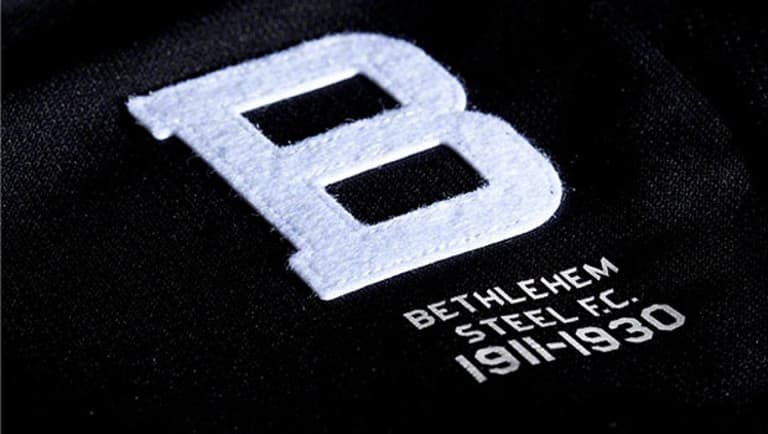
The Philadelphia Union's third jersey features a subtle nod to the history of the Bethlehem Steel with a large "B" on the lower left corner of the jersey. Says Union CEO Nick Sakiewicz: “It was all kind of sleeping history." (Major League Soccer)
–-
When the Philadelphia Union players march through the tunnel and onto the field for Tuesday’s US Open Cup championship game against the Seattle Sounders (7:30 pm ET; GolTV), they’ll be wearing a sleek black jersey with a “B” on the bottom of it and the Bethlehem Steel F.C. logo on the back.
That’s one way in which a legacy lives on.
“It’s got to be really special for the players to put that jersey on Tuesday night and go out there knowing that 100 years ago a team up the road lifted that trophy,” Union CEO Nick Sakiewicz says. “It’s pretty cool. You can say it’s a soccer full circle.”
When Sakiewicz first helped launch the Union, he studied the region’s soccer history, hoping to infuse some of it into his MLS franchise’s brand. But like Morrison, he soon realized that much of it had been erased from memory and that few people knew about the five Open Cups won by the Steel or the four won by the Philadelphia Ukrainian Nationals, including the city’s last USOC title in 1966.
Such was the impetus behind honoring the Steel with the Union’s third kit, which was unveiled to rave reviews before the 2013 MLS season.
“It was all kind of sleeping history,” Sakiewicz says. “It was not really well-documented or talked about. It was kind of hidden. I’d like to think the Philadelphia Union aided in uncovering this history and bringing it to light.”
Many of the Union players have said they love wearing the jersey, which they’ve done through all four of their US Open Cup games this year – a thrilling run that’s included two extra-time victories and another in a shootout, leading Sakiewicz to wonder if “maybe the ghosts of the Bethlehem Steel players are helping us.”
Union interim manager Jim Curtin isn’t quite as superstitious, but he didn’t rule out the possibility that seeing a “B” on their shirts has provided a spark during Philly’s run to what he’s calling the biggest game in the franchise’s five-year history.
“Is it the reason we win or lose? No,” Curtin says. “But at the same time, there’s that little extra reminder there are guys who have lifted a trophy before us. And now we’re gonna bring it back to Pennsylvania.”
The Bethlehem-inspired kit isn’t the only way the Union have honored their soccer ancestors. A whole production line of Bethlehem Steel apparel has been sold, including hats, t-shirts and scarves, with the items being such big sellers that Sakiewicz says that “there are not many of those suckers around anymore.”
And during this summer’s World Cup, the Union helped sponsor viewing parties at the SteelStacks in the south side of Bethlehem, with thousands of people showing up to cheer on the US national team, and some listening to Bethlehem Steel lectures conducted by Morrison.
“We feel like some of the Union’s DNA includes the Bethlehem Steel and all of the great teams that have played over the last 100 years in Philadelphia,” says Sakiewicz, who hopes to bring the Union to the Lehigh Valley in the future for a scrimmage. “It’s going to be a great day Tuesday no matter what. And wearing those jerseys are going to make it extra special.”
–-
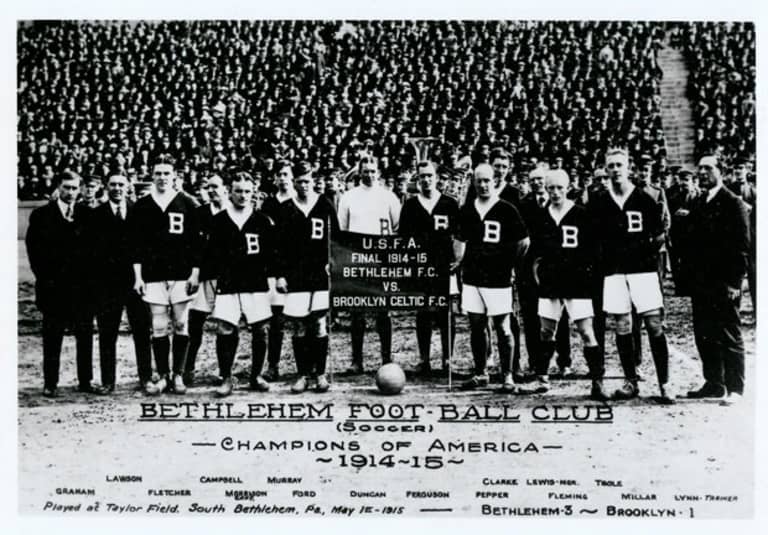
The 1914-15 Bethlehem Steel topped a field of 81 American teams to win their first of five US Open Cup titles, beating Brooklyn Celtic FC in the final in Bethlehem. They went on to enjoy two separate 42-game unbeaten streaks and capture four national titles in five years. (Photo courtesy of Dan Morrison)
–-
During one of the SteelStacks viewing parties, an 82-year-old man stood quietly by a booth that was selling apparel and memorabilia, surrounded by soccer fans on every side, when he glanced up and saw a 5 by 8 foot enlargement of one of the Bethlehem Steel national championship teams.
The man felt a chill. He was looking directly at his father.
“They had no idea who I was,” says Larry Sheridan, probably the closest living link to Bethlehem Steel F.C. His dad, Billy, managed the Steel during their heyday - and was also sometimes listed as the club’s trainer - which, to this day, still brings the son great pride.
“I have a connection with them,” says Sheridan, a lifelong resident of Bethlehem. “I always think about them. But you never read about them.”
Interestingly enough, coaching the Steel wasn’t even Billy Sheridan’s main gig. For more than 40 years, he coached Lehigh University wrestling, turning the program into a national powerhouse and posthumously earning his way into the National Wrestling Hall of Fame in 1976. But early in his tenure at Lehigh, the former amateur wrestling champion from Scotland was approached by a Bethlehem Steel executive and asked if he could also coach the company soccer team.
Sheridan’s response, according to Larry: “Sure, I’d have no trouble with that.”
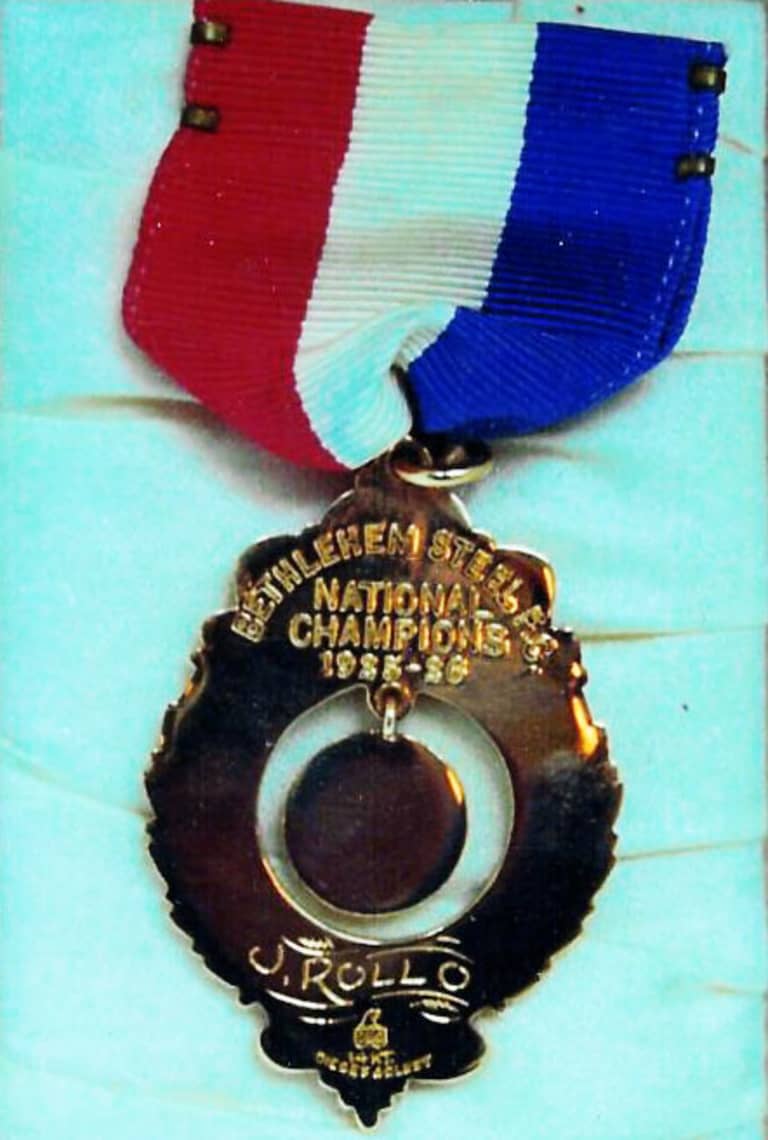
A photo of the 1925-26 national championship medal given to Bethlehem's Johnny Rollo. (Photo courtesy of Dan Morrison)
Sheridan’s job with the Steel was an interesting one. He was basically the same age of most of the players – almost all of who were fellow natives of England and Scotland – and much of his responsibility involved recruiting more people to work at the steel company and play soccer for his team while embarking on overseas tours. The Steel were actually the first American club team to cross the Atlantic when they took a steamship to Scandinavia in the summer of 1919 to play a series of international games shortly after the end of World War I. And Sheridan was responsible for paying for the travel expenses, which he took very seriously – and very carefully.
“Always when he traveled, he told me he put his wallet under the mattress and his gun not too far away,” Larry says. “You’re over in foreign countries playing soccer; you don’t know who the hell’s coming after you.”
The games themselves weren’t always pleasant, either. According to the Steel historian Morrison, it was notable if women came to watch from the stands “because it was kind of understood not to be a place where polite company happened.” And aside from hooliganism, Morrison also remembers learning that Bethlehem goalkeeper Dave Carson once ran off with a teammates’ wife.
“That kind of nonsense was going on,” Morrison says. “There were some rough personal characters.”
But given that most of them were neighbors and co-workers at the Bethlehem Steel Corporation, many of the team members were also very close, even long after they stopped playing and the club folded. Larry Sheridan still remembers sitting at the top of the stairs and listening to his dad playing cards with Bobby Morrison, Fred Pepper and Johnny Rollo when he was a young kid in the 1940s.
And he can still smell the cigar smoke wafting through his childhood home.
“Whatever he did, he did well,” Larry says of his dad. “If he decided to go to a fishing contest, he’d win. He was a checkers champion. He was a champion wrestler. About the only thing I could beat him in was golf.
“But he was a coach, first and foremost.”
–-
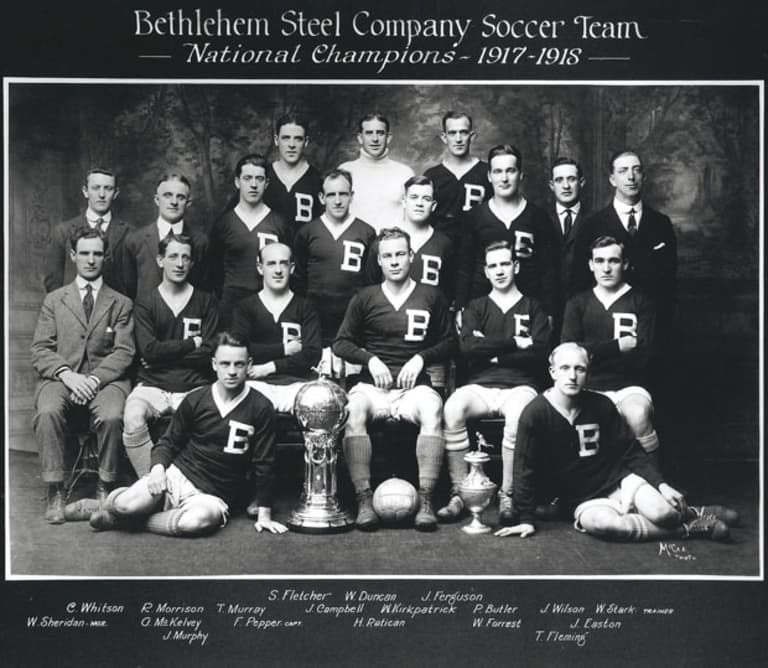
The 1917-18 Bethlehem Steel won the national title with a win over the Fall River (Mass.) Rovers. Despite a wealth of success that decade, attendance became a problem during in the 1920s and the Great Depression took a financial toll on the team, which eventually folded after the 1930 season. (Photo courtesy of Dan Morrison)
–-
While baseball may have been the biggest sport in the United States in the 1920s, the 18,000 people that jammed Ebbets Field on a warm April afternoon in 1926 weren’t there to see Brooklyn Dodgers. The record crowd was on hand to watch the finals of the 1926 US Open Cup (then called the National Challenge Cup) between the Bethlehem Steel and the Ben Millers from St. Louis.
Led by three goals from Hall of Famer Archie Stark, the Steel coasted to a 7-2 win to capture their fifth US Open Cup title – a record the club currently shares with Maccabi Los Angeles (which won the competition five times from 1973 to 1981).
Perhaps the only thing more relentless than the Steel’s attack was the newspaper report from the Bethlehem Globe-Times, which opened: “A much better soccer team, far superior in scientific play and more than matching the highly touted speed of the greyhounds comprising the Western Machine, won the National Challenge Cup competition.”
Later, the writer added that “once the game was under way there was no comparison and only for the occasional breakaways, which were few and far between, did the St. Louis boys have a look-in.”
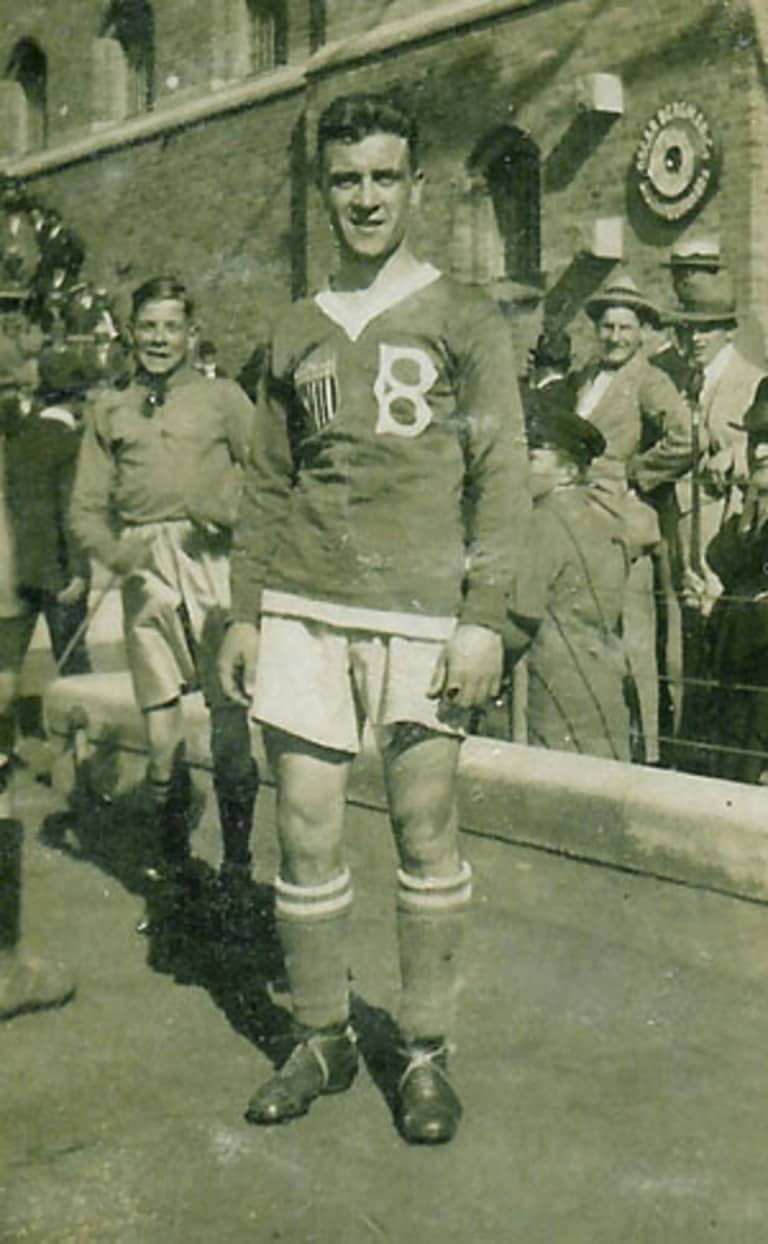
Bethlehem Steel forward Archie Stark scored 240 goals for the club between 1924-30. His single-season record of 70 goals for the team in 1924-25 was broken by 2012 - by Lionel Messi. (Photo courtesy of Dan Morrison)
For Morrison, that game was notable because of the heroics of Stark, who scored a whopping 240 goals for the Steel from 1924-30. But his favorite team was the one from 1914-15 that beat out 81 other American clubs to win their first Open Cup championship, capped by a 3-1 victory over Brooklyn Celtic in the title game. That began a remarkable run for the Steel, who captured four national titles in five years, knocking off the Fall River (Mass.) Rovers in 1916 and 1918 and Paterson F.C. (N.J.) in 1919.
“For me, the most exciting season is the 1914-15 season when they take their first US Open Cup,” Morrison says. “That’s when they start to become a powerhouse team. That’s also when they change from the Bethlehem Soccer Club to the Bethlehem Steel Soccer Club. The club had been formed by a bunch of guys from the Bethlehem Steel [Corporation]but it wasn’t a company team. But they were doing such remarkable things that the company takes notice and the company puts money behind it. And that’s when they start winning championship after championship.”
Morrison credits a man named H. Edgar Lewis, an executive vice president with the Bethlehem Steel Corporation, for having the vision to organize a dominant company soccer team (which was commonplace in that era). With loads of money rolling into the steel company because of World War I, the team imported a lot of European talent and built Steel Field, which is considered the country’s oldest soccer field with stadium seating and still stands today as Moravian College’s football field.
The Steel enjoyed two separate 42-game unbeaten streaks, won six American Cups (an early competitor to the National Challenge Cup), and dominated every league in which they played, leading to the formation of the more balanced American Soccer League in 1921. But according to Morrison, many newspaper articles he found from the 1920s dealt with “complaints that no one came out to see the team” – a “huge problem” that, along with financial issues caused by the Great Depression, eventually led to the team folding after the 1930 season.
And, in some ways, those attendance issues can still be felt today as even some lifelong Bethlehem residents know little about the soccer team that was once America’s best.
“Everyone who’s been in the town a long time is connected with the Bethlehem Steel company,” Morrison says. “But I met with people in Bethlehem who knew about Babe Ruth playing in Bethlehem once on a barnstorming tour and didn’t know anything about the soccer club.”
Occasionally, Bethlehem Steel F.C. will be brought back into the public consciousness. When Lionel Messi broke Archie Stark’s single-season scoring record in 2012, Morrison fielded calls from the Manchester Guardian to talk about Stark scoring 70 goals for the Steel in 1924-25. And Morrison’s lectures at the SteelStacks helped spread the word on the club, with Morrison reminding people that “what’s important is to understand that soccer in this country is older than Pelé.”
But nothing will help as much as a Major League Soccer team wearing Bethlehem-inspired kits for the championship game of a tournament the Steel won five times. And yet for Morrison, who will be at Tuesday’s game with his family, it’s more about simply shining a light on Bethlehem’s history; now it’s about making more of it.
“I feel like Philadelphia has this soccer history but somehow we’ve been denied the full glory,” he says. “I would like to see that glory come back here.”
Dave Zeitlin covers the Union for MLSsoccer.com. Email him at djzeitlin@gmail.com.


